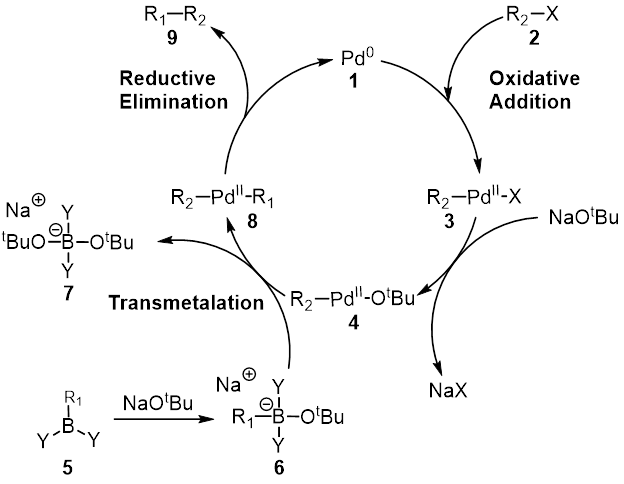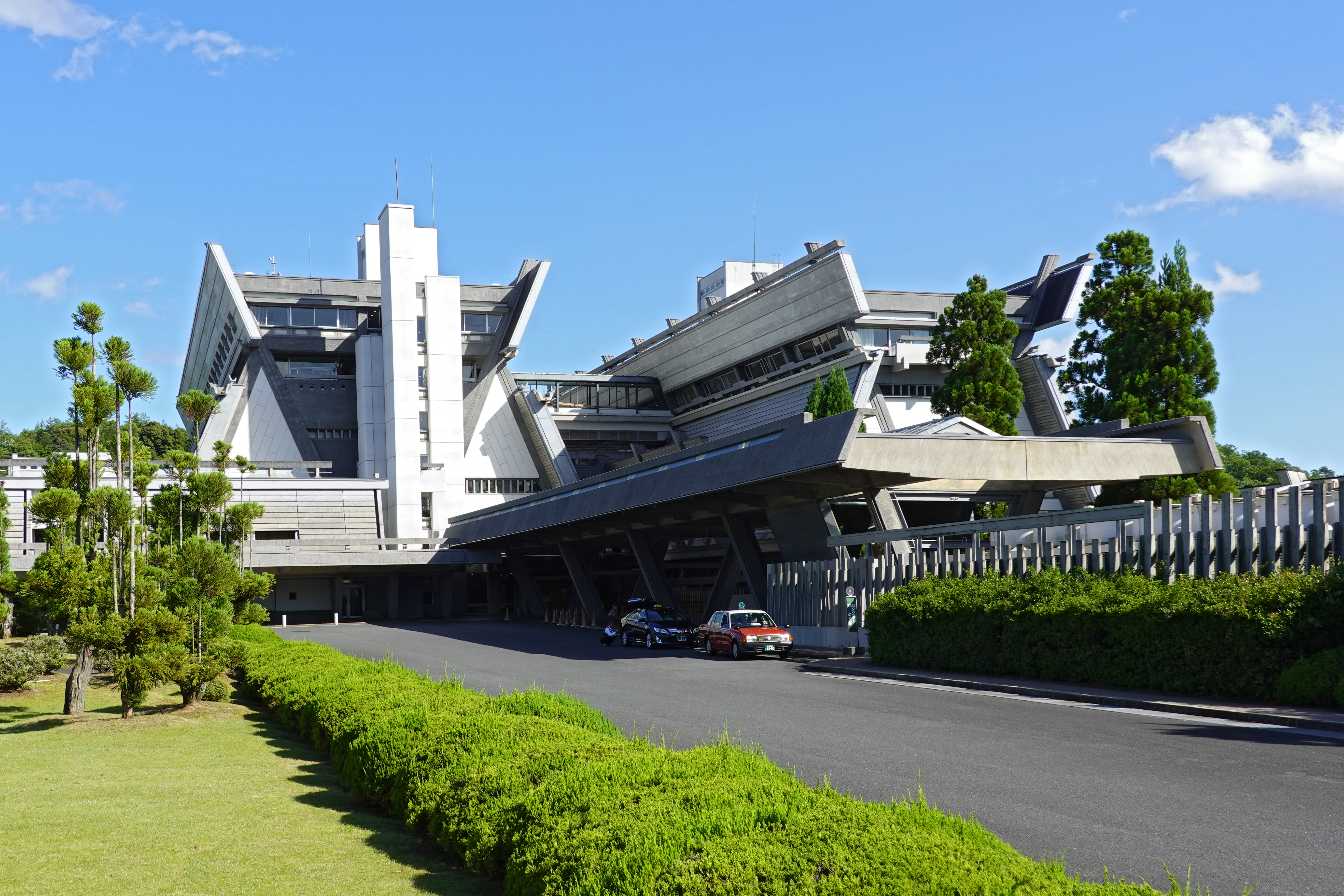|
Makoto Kumada
was a Japanese chemist and was a Professor of Chemistry first at Osaka City University until his retirement in 1983 at Kyoto University in Japan. In 1972, Kumada's group reported nickel-catalyzed cross coupling reactions nearly concurrently with the Corriu group working in France. The Kumada coupling now bears his name. In an interview after the 2010 Nobel Prize in Chemistry was announced, Nobel Committee member Jan Bekvall (professor at Stockholm University) said: "If Professor Kumada been alive, he could have won this year's Nobel Prize for his work in developing cross-coupling." See also *Richard F. Heck *Ei-ichi Negishi *Akira Suzuki *Kenkichi Sonogashira References * 1920 births 2007 deaths 20th-century Japanese chemists People from Fukui Prefecture Kyoto University alumni Academic staff of Kyoto University Scientists from Fukui Prefecture {{chemist-stub ... [...More Info...] [...Related Items...] OR: [Wikipedia] [Google] [Baidu] |
Kyoto University
, or , is a National university, national research university in Kyoto, Japan. Founded in 1897, it is one of the former Imperial Universities and the second oldest university in Japan. The university has ten undergraduate faculties, eighteen graduate schools, and thirteen research institutes. The university's educational and research activities are centred in its three main campuses in Kyoto: Yoshida, Uji and Katsura. The Kyoto University Library Network, consisting of more than 40 libraries spread across its campuses, has a collection of more than 7.49 million books, making it the second largest university library in the country. In addition to these campuses, the university owns facilities and lands for educational and research purposes around the country. As of 2024, Kyoto University counts List of prime ministers of Japan by education, two prime ministers of Japan amongst its alumni. Additionally, three prime ministers of Japan attended the Third Higher School, a university p ... [...More Info...] [...Related Items...] OR: [Wikipedia] [Google] [Baidu] |
Akira Suzuki
is a Japanese chemist and Nobel Prize Laureate (2010), who first published the Suzuki reaction, the organic reaction of an aryl- or vinyl- boronic acid with an aryl- or vinyl- halide catalyzed by a palladium(0) complex, in 1979. Early life and education Suzuki was born on September 12, 1930, in Mukawa, Hokkaidō, his father died when he was in high school. He studied chemistry at Hokkaido University (Hokudai) and after receiving his PhD while he worked there as assistant professor. He initially wanted to major in mathematics, as his favorite subject in childhood was arithmetic.『朝日小学生新聞』2010年10月8日 It was an encounter with two books that became an opportunity to advance to the path of organic synthesis, one is ''Textbook of Organic Chemistry'' written by Louis Fieser of Harvard University, and another is ''Hydroboration'' written by Herbert C. Brown of Purdue University. Career From 1963 until 1965, Suzuki worked as a postdoctoral student with Herber ... [...More Info...] [...Related Items...] OR: [Wikipedia] [Google] [Baidu] |
Kyoto University Alumni
Kyoto ( or ; Japanese language, Japanese: , ''Kyōto'' ), officially , is the capital city of Kyoto Prefecture in the Kansai region of Japan's largest and most populous island of Honshu. , the city had a population of 1.46 million, making it the List of cities in Japan, ninth-most populous city in Japan. More than half (56.8%) of Kyoto Prefecture's population resides in the city. The city is the cultural anchor of the substantially larger Greater Kyoto, a metropolitan statistical area (MSA) home to a census-estimated 3.8 million people. It is also part of the even larger Keihanshin, Keihanshin metropolitan area, along with Osaka and Kobe. Kyoto is one of the oldest municipalities in Japan, having been chosen in 794 as the new seat of Japan's imperial court by Emperor Kanmu. The original city, named Heian-kyō, was arranged in accordance with traditional Chinese feng shui following the model of the ancient Chinese capitals of Chang'an and Luoyang. The emperors of Japan ruled fro ... [...More Info...] [...Related Items...] OR: [Wikipedia] [Google] [Baidu] |
People From Fukui Prefecture
The term "the people" refers to the public or common mass of people of a polity. As such it is a concept of human rights law, international law as well as constitutional law, particularly used for claims of popular sovereignty. In contrast, a people is any plurality of persons considered as a whole. Used in politics and law, the term "a people" refers to the collective or community of an ethnic group or nation. Concepts Legal Chapter One, Article One of the Charter of the United Nations states that "peoples" have the right to self-determination. Though the mere status as peoples and the right to self-determination, as for example in the case of Indigenous peoples (''peoples'', as in all groups of indigenous people, not merely all indigenous persons as in ''indigenous people''), does not automatically provide for independent sovereignty and therefore secession. Indeed, judge Ivor Jennings identified the inherent problems in the right of "peoples" to self-determination, as i ... [...More Info...] [...Related Items...] OR: [Wikipedia] [Google] [Baidu] |
2007 Deaths
This is a list of lists of deaths of notable people, organized by year. New deaths articles are added to their respective month (e.g., Deaths in ) and then linked below. 2025 2024 2023 2022 2021 2020 2019 2018 2017 2016 2015 2014 2013 2012 2011 2010 2009 2008 2007 2006 2005 2004 2003 2002 2001 2000 1999 1998 1997 1996 1995 1994 1993 1992 1991 1990 1989 1988 1987 1986 Earlier years ''Deaths in years earlier than this can usually be found in the main articles of the years.'' See also * Lists of deaths by day * Deaths by year (category) {{DEFAULTSORT:deaths by year ... [...More Info...] [...Related Items...] OR: [Wikipedia] [Google] [Baidu] |
1920 Births
Events January * January 1 ** Polish–Soviet War: The Russian Red Army increases its troops along the Polish border from 4 divisions to 20. ** Kauniainen in Finland, completely surrounded by the city of Espoo, secedes from Espoo as its own market town. * January 7 – Russian Civil War: The forces of White movement, Russian White Admiral Alexander Kolchak surrender in Krasnoyarsk; the Great Siberian Ice March ensues. * January 10 ** The Treaty of Versailles takes effect, officially ending World War I. ** The League of Nations Covenant enters into force. On January 16, the organization holds its first council meeting, in Paris. * January 11 – The Azerbaijan Democratic Republic is recognised de facto by European powers in Palace of Versailles, Versailles. * January 13 – ''The New York Times'' Robert H. Goddard#Publicity and criticism, ridicules American rocket scientist Robert H. Goddard, which it will rescind following the launch of Apollo 11 in 1969. * Janua ... [...More Info...] [...Related Items...] OR: [Wikipedia] [Google] [Baidu] |
Angewandte Chemie International Edition
''Angewandte Chemie'' (, meaning "Applied Chemistry") is a weekly peer-reviewed scientific journal that is published by Wiley-VCH on behalf of the German Chemical Society (Gesellschaft Deutscher Chemiker). Publishing formats include feature-length reviews, short highlights, research communications, minireviews, essays, book reviews, meeting reviews, correspondences, corrections, and obituaries. This journal contains review articles covering all aspects of chemistry. According to the ''Journal Citation Reports'', the journal had a 2023 impact factor of 16.1. Editions The journal appears in two editions with separate volume and page numbering: a German edition, ''Angewandte Chemie'', and a fully English-language edition, ''Angewandte Chemie International Edition''. The editions are identical in content with the exception of occasional reviews of German-language books or German translations of IUPAC recommendations. Publication history In 1887, Ferdinand Fischer established the '' ... [...More Info...] [...Related Items...] OR: [Wikipedia] [Google] [Baidu] |
Kenkichi Sonogashira
is a Japanese chemist and was a professor of chemistry at Osaka University in Japan. He discovered the Sonogashira coupling in 1975. Sonogashira was later a professor at Osaka City University and retired in 2004. See also * Richard F. Heck *Makoto Kumada * Ei-ichi Negishi *Akira Suzuki is a Japanese chemist and Nobel Prize Laureate (2010), who first published the Suzuki reaction, the organic reaction of an aryl- or vinyl- boronic acid with an aryl- or vinyl- halide catalyzed by a palladium(0) complex, in 1979. Early life a ... ReferencesSONOGASHIRA Kenkichi 1931 births Living people Japanese chemists Osaka University alumni Academic staff of Osaka University Scientists from Kagoshima Prefecture {{chemist-stub ... [...More Info...] [...Related Items...] OR: [Wikipedia] [Google] [Baidu] |
Ei-ichi Negishi
was a Japanese chemist who was best known for his discovery of the Negishi coupling. He spent most of his career at Purdue University in the United States, where he was the Herbert C. Brown Distinguished Professor and the director of the Negishi-Brown Institute. He was awarded the 2010 Nobel Prize in Chemistry "for palladium catalyzed cross couplings in organic synthesis" jointly with Richard F. Heck and Akira Suzuki.Press releaseGreat art in a test tube Royal Swedish Academy of Sciences. Accessed October 6, 2010. Early life and education Negishi was born in Xinjing (today known as Changchun), the capital of Manchukuo, in July 1935. Following the transfer of his father who worked at the South Manchuria Railway in 1936, he moved to Harbin, and lived eight years there. In 1943, when he was nine, the Negishi family moved to Incheon, and a year later to Kyongsong Prefecture (now Seoul), both in Japanese-occupied Korea. In November 1945, three months after World War II ende ... [...More Info...] [...Related Items...] OR: [Wikipedia] [Google] [Baidu] |
Toshiba
is a Japanese multinational electronics company headquartered in Minato, Tokyo. Its diversified products and services include power, industrial and social infrastructure systems, elevators and escalators, electronic components, semiconductors, hard disk drives, printers, batteries, lighting, as well as IT solutions such as quantum cryptography. It was formerly also one of the biggest manufacturers of personal computers, consumer electronics, home appliances, and medical equipment. The Toshiba name is derived from its former name, Tokyo Shibaura Denki K.K. which in turn was a 1939 merger between Shibaura Seisaku-sho (founded in 1875) and Tokyo Denki (founded in 1890). The company name was officially changed to Toshiba Corporation in 1978. A technology company with a long history and sprawling businesses, Toshiba is a household name in Japan and has long been viewed as a symbol of the country's technological prowess post-World War II. As a semiconductor company and the i ... [...More Info...] [...Related Items...] OR: [Wikipedia] [Google] [Baidu] |
Richard F
Richard is a male given name. It originates, via Old French, from compound of the words descending from Proto-Germanic language">Proto-Germanic ''*rīk-'' 'ruler, leader, king' and ''*hardu-'' 'strong, brave, hardy', and it therefore means 'strong in rule'. Nicknames include " Richie", " Dick", " Dickon", " Dickie", " Rich", " Rick", "Rico (name), Rico", " Ricky", and more. Richard is a common English (the name was introduced into England by the Normans), German and French male name. It's also used in many more languages, particularly Germanic, such as Norwegian, Danish, Swedish, Icelandic, and Dutch, as well as other languages including Irish, Scottish, Welsh and Finnish. Richard is cognate with variants of the name in other European languages, such as the Swedish "Rickard", the Portuguese and Spanish "Ricardo" and the Italian "Riccardo" (see comprehensive variant list below). People named Richard Multiple people with the same name * Richard Andersen (other) * ... [...More Info...] [...Related Items...] OR: [Wikipedia] [Google] [Baidu] |




